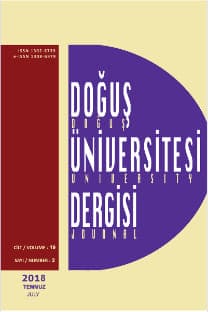COĞRAFİ KOMŞULUĞUN ve KÜLTÜREL YAKINLIĞIN OY VERME DAVRANIŞINA ETKİSİ: EUROVİSİON ŞARKI YARIŞMASI
Oy Verme Davranışı, Eurovision Şarkı Yarışması, Kültürel Komşuluk, Coğrafi Komşuluk, İki Aşamalı EKK
THE EFFECT OF GEOGRAPHICAL AND CULTURAL AFFINITY TO THE VOTING BEHAVIOR IN THE EUROVISION SONG CONTEST
Voting Behavior, Eurovision Song Contest, Cultural Neighborhood, Geographic Neighborhood, Two-Stage Least Squares,
___
- CLERIDES, S., STENGOS, T. (2006). Love thy neighbor, love thy kin: Voting biases in the Eurovision Song Contest. Discussion Paper. [Erişim adresi]: http://ssrn.com/ abstract=882383 [Erişim tarihi: 26.07.2013].
- DEKKER, A. (2007). The Eurovision Song Contest as a ‘Friendship’ network. Connections, 27(3), 53-58.ss.
- DOOSJE. B., HASLAM, S.A. (2005) What have they done for us lately? The dynamics of reciprocity in Intergroup Contexts? Journal of Applied Social Psychology, 35(3), 508-535.ss.
- EUROVISION TV. [Erişim adresi]: http://www.eurovision.tv/page/history/year [Erişim tarihi: 10.12.2012].
- EUROVISION SONG CONTEST STATISTICS. [Erişim adresi]: http://www. escstats.com [Erişim tarihi: 15.08.2012].
- FENN, D., SULEMAN, O., EFSTATHIOU, J., JOHNSON, N.F. (2006). How does Europe make its mind up? Connections, cliques and compatibility between countries in the Eurovision Song Contest. Physica A, 360, 576–598.ss.
- FLORES, R.G., GINSBURGH, V.A. (1996). The Queen Elisabeth musical competition: how fair is the final ranking? The Statistician, 97-104.
- GINSBURGH, V. (2003). Awards, success and aesthetic quality in the arts, Journal of Economic Perspectives, 17, 99-111.ss.
- GINSBURGH, V., NOURY, A. (2004).Cultural voting in the Eurovision Song Contest. Discussion Papers: [Erişim adresi: http://www.core.ucl]. [Erişim tarihi: 15.08.2012].
- GINSBURGH, V., NOURY, A. (2008). The Eurovision Song Contest. Is voting political or cultural?. European Journal of Political Economy 24(1), 41-52.ss.
- GLEJSER, H., HEYNDELS, B.(2001). The ranking of finalists in the Queen Elisabeth International music competition. Journal of Cultural Economics, 25 (2), 109-129.ss.
- HAAN, M., DIJKSTRA, S.G., DIJKSTRA, P.T. (2005). Expert judgment versus public opinion: Evidence from the Eurovision Song Contest. Journal of Cultural Economics (29), 59-78.ss.
- KAGGLE. [Erişim adresi]: http://www.kaggle.com [Erişim tarihi: 15.08.2012].
- KORKMAZ, L. (2012). Ulusal kimliğin semboller ve Eurovisionla temsili, Pivolka, 21 (7), 2-6.ss.
- MANÇO, U. (2004). Turks in Western Europe. Centrum vor Islam in Europe, University of Ghent, Belgium. [Erişim adresi]: http://www.flwi.ugent.be/cie/umanco/ [Erişim tarihi: 15.12.2012].
- NIESSEN, J., SCHIBEL, Y., THOMPSON, C. (2005). Current immigration debates in Europe: A publication of the European migration dialogue. KEMO, Minority Groups Research Center, 1-28.
- OCHOA, A., ZAVALA, A.E.M., AGUIRRE, A.H. (2009). A hybrid system approach to determine the ranking of a debutant country in Eurovision. Journal of Computers, 4 (8), 713-720.ss.
- SPIERDIJK, L., VELLEKOOP, M. (2006). Geography, culture, and religion: Explaining the bias in Eurovision Song Contest voting, Memorandum Discussion Paper, No. 1794.
- SPIERDIJK, L., VELLEKOOP, M. (2009). The structure of bias in peer voting systems: lessons from the Eurovision Song Contest. Empirical Economics, 36 (2), 403-425.ss.
- YAIR, G. (1995). Unite Europe: The political and cultural structures of Europe as reflected in the Eurovision song contest. Social Networks, 17 (2), 147–161.ss.
- YAIR, G., MAMAN, D. (1996). The persistent structure of hegemony in the Eurovision Song Contest. Acta Sociologica, 39, 309-325.ss.
- ISSN: 1302-6739
- Yayın Aralığı: 2
- Başlangıç: 2000
- Yayıncı: Doğuş Üniversitesi
TÜRKİYE’DE e-DEVLET SİSTEMİNE FARKLI BİR BAKIŞ: e-DEVLET VE TASARRUF İLİŞKİSİ
KÖTEKLİ, AKÇAOVA ARAKAT FİYATLARI VE YATIRIM KARARI
Cem Mehmet BAYDUR, Ahmet BÜYÜKDUMAN
KÜMELEME ANALİZİ İLE SAĞLIK GÖSTERGELERİNE GÖRE TÜRKİYE’DEKİ İLLERİN SINIFLANDIRILMASI
KÜMELEME ANALİZİ İLE SAĞLIK GÖSTERGELERİNE GÖRE TÜRKİYE'DEKİ İLLERİN SINIFLANDIRILMASI
Hakkı Okan YELOĞLU, Abdülkadir VAROĞLU
2008 KÜRESEL EKONOMİK KRİZİNİN İŞLETMELER ÜZERİNDEKİ ETKİLERİ
COĞRAFİ KOMŞULUĞUN ve KÜLTÜREL YAKINLIĞIN OY VERME DAVRANIŞINA ETKİSİ: EUROVİSİON ŞARKI YARIŞMASI
TÜRKİYE'DE e-DEVLET SİSTEMİNE FARKLI BİR BAKIŞ: e-DEVLET VE TASARRUF İLİŞKİSİ
EFFECTS OF FREE FLOAT RATIOS ON STOCK PRICES:AN APPLICATION ON ISE
